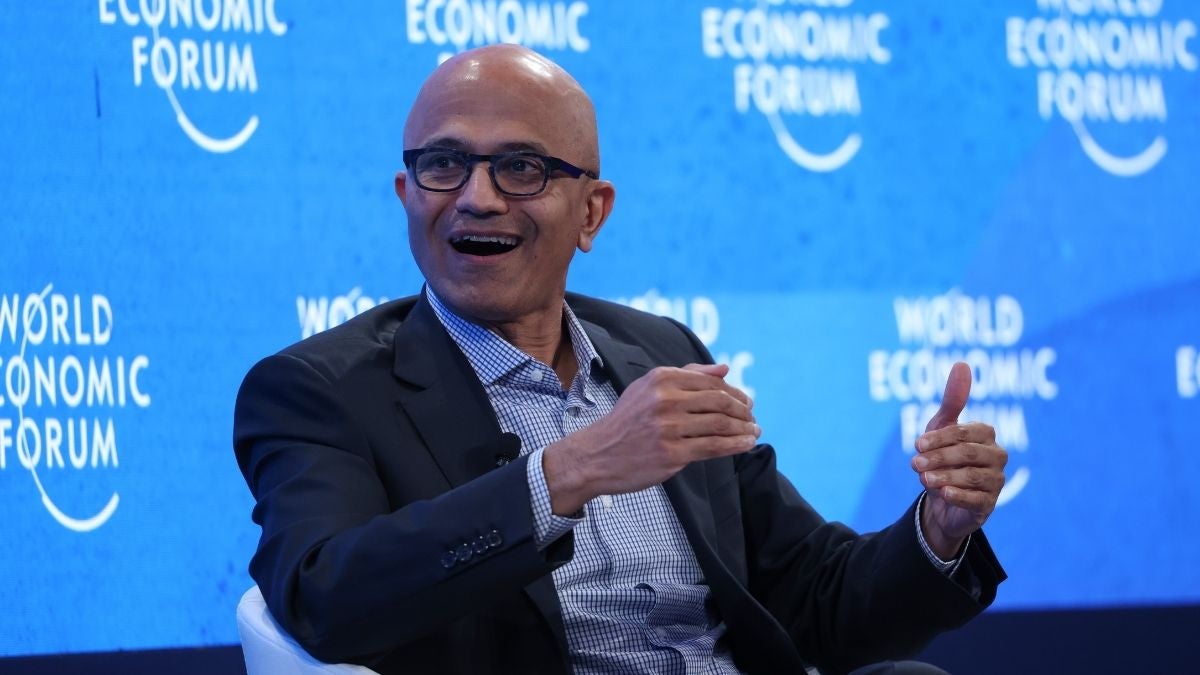
Onboarding is not just for new staff at Microsoft. All 181,000 of its employees are currently going through the onboarding process in order to get to grips with the company’s post-pandemic culture and mission, according to its CEO Satya Nadella.
Microsoft has hired 60,000 people over the past two years. During an interview at the World Economic Forum in Davos, Nadella explained that the changes both internally and externally have meant that “it’s not just the 60,000 people, in fact the entirety of the company needs to be re-onboarded”.
This is part of a process which he described as “refounding the company for a changed world”. “None of us are coming out of this pandemic assuming we’re going to go back to 2019,” he added. “We have to find a new way going forward and, in that context, employees and their expectations are paramount.”
As part of Microsoft’s refounding, Nadella is exploring many elements of the employee experience, including compensation, flexibility, management expectations and the company culture. Highlighting the importance of this work he said: “They [employees] are one of the most important stakeholders. Without employees, there is no company.”
Last week, a company-wide memo informed Microsoft staff that the company is improving its compensation packages in order to help staff cope with rising inflation and to stave off competition in the jobs market.
Nadella has also previously described hybrid working as “the biggest shift to how we work in a generation”. Currently, Microsoft employees have the option to work remotely up to 50% of the time and there is flexibility in the hours and geographic location that they can operate from too.
“It’s becoming an expectation that the workplace will integrate with people’s need for flexibility, so that they can achieve harmony between work and life,” Nadella said.
Nadella on the great resignation
This flexibility is also being reflected in the labour market as people continue to switch between jobs, in what has been dubbed the great resignation.
A need for greater fulfilment from work and better compensation is helping to fuel this trend, which began during the pandemic. According to a recent PwC study, one in five workers say they are likely to switch employers within the next 12 months.
However, Nadella doesn’t regard this shift as a great resignation. “Really it’s a great reshuffle because people are not actually leaving the workforce or changing their jobs,” he said. “People either want a different profession, a different industry or a different company.”
In order to retain staff, employers need to make their work more meaningful, Nadella said. “If work is transactional, that is when the company suffers.”
This feeds into the wider social purpose of a business, which Nadella defines as “creating profitable solutions to the challenges of people and the planet”. However, he believes that there is an extra element to the definition for multinational companies such as Microsoft.
If work is transactional, that is when the company suffers
“Companies like ours have to earn the licence to operate in every country and community we are in,” he added. “You actually have to prove that you belong everywhere you operate by creating local surplus and local benefits to the community.”
This could mean assisting local governments in making public services more efficient or helping small businesses in the region become more productive. Nadella said: “The business model of the company needs to have trust with the broader society because, after all, if you don’t have that, then pretty much anything you do is not going to be trustworthy.”
But this is not simply an altruistic purpose; Nadella claims that operating in a more successful global environment will bring its own rewards for the business. “Our growth is subject to the following limit, which is the world around us,” he said. “Microsoft will only do well when the world around us is doing much better.”
He therefore judges the success of Microsoft by the amount of value added output its digital technologies produce for economic growth across the world.
He added: “We all have to strive for inflation-adjusted economic growth that is aligned with the planet and is more equitable. That is going to be the most important thing that we will have to achieve in order to earn our right to continue as a business.”

Onboarding is not just for new staff at Microsoft. All 181,000 of its employees are currently going through the onboarding process in order to get to grips with the company’s post-pandemic culture and mission, according to its CEO Satya Nadella.
Microsoft has hired 60,000 people over the past two years. During an interview at the World Economic Forum in Davos, Nadella explained that the changes both internally and externally have meant that “it's not just the 60,000 people, in fact the entirety of the company needs to be re-onboarded”.
This is part of a process which he described as “refounding the company for a changed world”. “None of us are coming out of this pandemic assuming we're going to go back to 2019,” he added. “We have to find a new way going forward and, in that context, employees and their expectations are paramount.”
